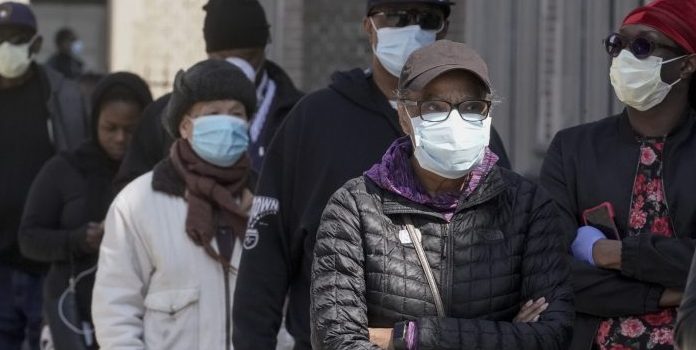(Headline USA) Despite fears that the coronavirus pandemic will worsen, Victor Gibson said he’s not planning to take advantage of Michigan’s expanded vote-by-mail system when he casts his ballot in November.
The retired teacher from Detroit just isn’t sure he can trust it. Many black Americans share similar concerns and are planning to vote in person on Election Day, even as mail-in voting expands to more states as a safety precaution during the pandemic.
For many, worries that a mailed ballot won’t get counted outweigh the prospect of long lines and health dangers from the virus. Ironically, suspicion of mail-in voting aligns with the views of President Donald Trump, whom some black voters want out of office.
Trump took it a step further Tuesday, suggesting a “delay” to the Nov. 3 presidential election, which would take an act of Congress.
“I would never change my mind” about voting in person in November, said Gibson, who is black and hopes Trump loses. “I always feel better sliding my ballot in. We’ve heard so many controversies about missing absentee ballots.”
Widespread problems with mail-in ballots during this year’s primary elections have added to the skepticism.
Patricia Harris of McDonough, Georgia, south of Atlanta, voted in person in the primary and said she will do the same in November.
“I simply do not trust mail-in or absentee ballots,” said Harris, 73, a retired event coordinator at Albany State University. “After the primary and the results were in, there were thousands of absentee ballots not counted.”
In Georgia, roughly 12,500 mail-in ballots were rejected in the state’s June primary, while California tossed more than 100,000 absentee ballots during its March primary.
Reasons vary, from ballots being received after the deadline to voters’ signatures not matching the one on file with the county clerk.
In Wisconsin’s April primary, thousands of voters in Milwaukee said they didn’t receive absentee ballots in time and had to vote in person. Lines stretched several blocks, and people waited two hours or more.
In Kentucky’s June primary, more than 8,000 absentee ballots were rejected in Jefferson County, which includes Louisville.
Many people in Louisville’s historically black West End neighborhood voted in person because they didn’t receive an absentee ballot or simply wanted to vote in a way that was familiar to them, said Arii Lynton-Smith, an organizer with Black Lives Matter Louisville.
“That’s particularly why we knew we had to have the poll rides as an option,” she said, referring to groups offering voters free transportation to polling places. “It’s not as easy to do an absentee ballot and the things that come along with it than it is to just go in person.”
The Rev. Earle Fisher, senior pastor at Abyssinian Missionary Baptist Church in Memphis and a prominent Black civil rights activist, is one of the plaintiffs in a state lawsuit calling for mail-voting access for everyone. He said he’s not pushing his community to vote by mail but wants to ensure it’s an option given the health dangers.
To ease doubts, he wants voters to be able to drop off their ballot at a polling place so they won’t have to worry about the post office delivering it on time.
“I would like to see every righteous and creative method and measure taken, but we are up against a voter suppression apparatus that oftentimes is orchestrated by, or at least sustained by, people who are elected or appointed to office,” Fisher said.
Adapted from reporting by Associated Press.

